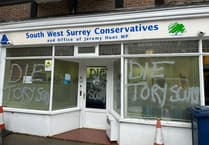AN Alresford dentist has been found guilty of serious professional misconduct and suspended from the register for 28 days after falsely claiming payments from the NHS which had already been received from patients.
Stephen Eric Fellows, registered at 38 West Street, Alresford, appeared before the General Dental Council in London last week accused of serious professional misconduct in relation to four patients, identified only as one, two, three and four.
At the hearing it was alleged that Mr Fellows billed the NHS for treatments administered to these patients, all of whom were private clients. All the work in question was carried out between March and July 1998.
Although Mr Fellows admitted the facts, he claimed the payments were requested as a result of a systems failure.
Martin Forde, counsel for the GDC, said Mr Fellows had been running his own practice since 1983. In relation to the allegation, he questioned if this was "an oversight or is there something more sinister afoot?" If so, he said, it would "in effect be an attempt to defraud the NHS".
The matter had come to light as a result of a Dental Practice Board survey.
Mr Forde said: "There were 21 patients questioned in all, 18 replied and as a result of their replies a number of irregularities in relation to these patients were found to have arisen."
A police investigation was subsequently launched but later dropped because of insufficient evidence.
Mr Forde read out a statement from patient one, an elderly woman who was unable to attend. She first registered in 1996 but in her case the allegation related to the period between June 1 and 20, 1998. During that time she had a crown fitted and returned again to the surgery. The work cost £219.50 over all.
Patient one, who is now seeing another dentist in the area said: "I believed this was private rather than NHS treatment."
Patient two joined the practice in 1987 on the NHS. He said: "About three years later I was told by Mr Fellows that he was going to take private patients and his colleague was going to take NHS patients. I decided to stay with him."
Between April and July 22, 1998, patient two paid £180 for a crown and £34.50 for subsequent adjustments. These were both payments for which Mr Fellows allegedly debited the NHS.
Patient two has remained with Mr Fellows and said: "My dental treatment over the years goes back a very long way from the services and back and I am entirely satisfied with the treatment I have received."
Patient three joined the surgery after he moved to the area in 1989. He agreed to go privately and paid £10.70 per month by direct debit. In his case the allegation related to a period in or around June 1998.
Having since changed dentist, he said: "I was given the option of being on the NHS at the time, although I chose Mr Fellows' scheme because I thought it presented better value for money."
Patient four and her husband have been registered with Mr Fellows for about 13 years and are still clients. They paid £20 per month between them for the private scheme.
She told the committee: "I was going to have a bridge put in and if I had it done privately it would be better porcelain and a better match."
She said the payment scheme included four annual appointments with the hygienist, two with the dentist and other routine work.
Explaining why she remained at the surgery, she said: "Mr Fellows always verbally explains what he is doing in my mouth and I am satisfied with his work."
The professional investigation was carried out by Roger Etwell of the Dental Practice Board. He said: "We would normally expect a patient paying for a private dental plan to be just that - a private patient."
If there was a systems failure, he explained, Mr Fellows would still be liable as the bills were submitted under his dental pin number.
He said: "The dentist, although he might not necessarily press the button himself, is deemed responsible for any transmission sent out on his pin number."
Mr Fellows, who qualified from Birmingham University in 1973, told the committee that his practice included two dentists and two hygienists.
He said he personally stopped taking NHS patients in 1991 as his workload had become too heavy. It was only when a colleague left in 1993 that Mr Fellows reverted to some NHS work.
He said: "I had to back-pedal and start treating NHS patients again." He added: "I thought that things were going along smoothly and wasn't really aware that there was a problem building up."
He blamed complicated administration and an ineffective computer system for the mistake.
In respect of patients three and four, he acknowledged that the mistake may have arisen because these patients were treated part-privately and part-on the NHS.
But, in respect of patients one and two he said: "I had no idea that anything had been sent off. When we first became aware of the problem obviously we had to look into it and find out if we could investigate the case."
He explained that emergency staff meetings were called and the matter swiftly dealt with. A new computer system and software were ordered and some staff let go. New staff had undergone extensive training.
In his submission, Philip Gaisford, for Mr Fellows said: "It is regrettable that these charges were made. However, I do ask the committee to take the view that this wasn't happening deliberately and I would ask the committee to take into account the character of the respondent."
In support of this, several testimonials were shown to the committee.
In finding Mr Fellows guilty of serious professional misconduct, committee chairman Prof Ronnie Laird explained the reason for the decision: "In making this determination, the committee has had regard to the element of intent and the fact that financial mismanagement on any scale is a very serious offence.
"The committee had been gravely concerned at the standard of book-keeping displayed and by the associated shortfall in meeting ethical behaviour, as required in the council's guidance, especially in respect of the responsibility of a dentist to explain clearly the nature of a contract and in particular whether the patient is being treated under the NHS or some other arrangement."



